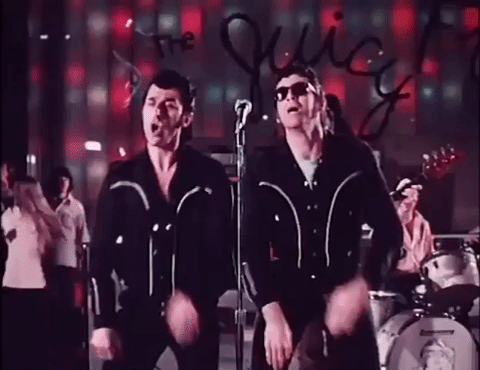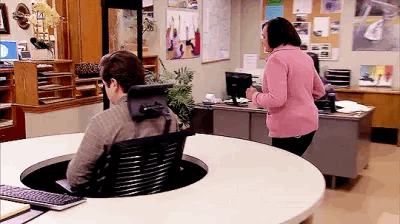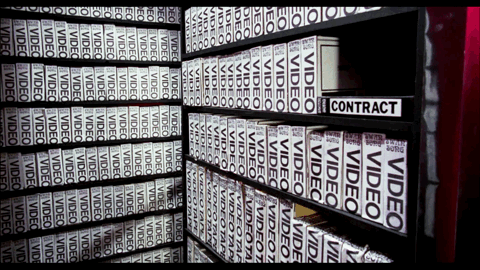Happy Halloween! Let’s show these industry music phonies what a REAL artist looks and sounds like by murdering everyone that goes against our vision!

I will admit, I had absolutely no idea what I was getting into watching Phantom of the Paradise, and how intense its Phans are. Its production is probably one of the most well documented out of all the movies I’ve written about on this list so far… so much so I had to cut off my research phase before the materials ran out because I never would have released this on time otherwise. Conventions, and interviews, and painstakingly written breakdowns of every scene in the movie, oh my!
I’m going to have to release a redux version of this next year, aren’t I?
I thought this would be a weird 70s rock version of The Phantom of the Opera, which it is, but it is also Faust, The Picture of Dorian Gray, and like 3 decades worth of musical genres. Phantom of the Paradise is directed by Brian De Palma, who is probably more well-known for his work on Carrie and Scarface. I’ve never seen a single one of his movies, but that’s OK, everything I need to know about him is succinctly outlined in this review of The Black Dahlia, and while you could prolly watch the entire movie in the time it takes you to watch Willie’s recap of it, why would you want to?
Apparently Mr. De Palma wrote Phantom of the Paradise after hearing a muzak version of The Beatles in an elevator and was so salty about it he had to make an entire movie about the music industry bastardizing creative genius and like, sure. This isn’t the first movie on this list to bitch about how exploitative the music and film industries can be, but this is the only one where the dude wears a metal bird helmet and murders people.

Phantom begins like any other Twilight Zone episode, with narration from Rod Serling warning us a monster may live in the opera house, but it might not appear as one in the beginning. We’re then introduced to The Juicy Fruits, Death Records’ latest retro musical act, put together by their President and first bird-related character name, Swan. They sing a song about how some dude killed himself to sell more records, which isn’t at all foreshadowing the events that happen later in the film. After they’re done recording, some Ben Folds motherfucker who was acting as their pianist starts playing exerts from his original cantata Faust.
Swan likes what he hears and asks his lackey Arnold Philbin to get a few songs from the ironically named Winslow Leach so The Juicy Fruits can record them. When the doo-wop band is mentioned, Winslow loses his absolute shit and insists “Faust” can only be sung by him and him alone. Arnold is like, “Cool, dude, that’s chill, just give me a few of the songs from your weirdly long 300 page sonata and Swan will think about producing your new album.” Winslow gives up the goods and Swan *surprisingly* never contacts him again.

About a month later, Winslow tries to approach Swan at Death Records, and immediately I’m reminded of greasy pop-punk kids wearing Atticus t-shirts roaming the halls of my high school. In Phantom, this logo was awkwardly plastered over building signs, podiums, television sets, tape recorders, cameras, and whole mess of other things in post-production, and it uhhh, stood out.

I thought perhaps this was to cut costs on props, but turns out these signs originally read “Swan Song Records”, which is morbidly poetic. Unfortunately for everyone involved, Led Zeppelin formed Swan Song Records in the time between the film finished shooting and the release of the film. To avoid a lawsuit, 20th Century Fox forced the team to edit out any references to Swan Song, and it is super noticeable and several years later people are still screaming about releasing the Swan Song cut.
Winslow gets booted from the building, and tracks Swan down at his home compound, Swanage. TURNS OUT, Swan is holding auditions for his latest rock opera, Faust! Winslow meets Phoenix while she’s rehearsing his song while waiting and instantly falls in love. He reveals he wrote the song, and she fawns over him in an attempt to get cast in the background chorus. He takes her kindness as a sign of affection, and spends the rest of the movie obsessed with her.

After Philbin tries to casting-couch Phoenix and she runs off, Winslow disguises himself as a hot chick in order to gain access to Swan. He politely inquires what the fuck is up with Swan yanking Faust out from under him, and the confrontation goes about as well as expected. Winslow gets physically removed, framed for possession of heroin, and lugged off to do time in the aptly named Sing Sing.

Swan, played by Paul Williams, is also the composer of this film. He wrote songs for the Muppet-based movies that appear on this list, including “The Rainbow Connection”, “Movin’ Right Along”, and “When Love is Gone”, but also found success writing for pop acts like Daft Punk, David Bowie and The Carpenters. While Phantom of the Paradise pretty much bombed upon release, the soundtrack went gold in Canada because 20k copies of it were sold in my motherland of Winnipeg, Manitoba. For context, that’s 40% of its total record sales. The movie had a 18-week run in the city, and had a brief resurgence later that summer when Paul Williams played a concert there. There have been a few retrospectives conducted to understand why exactly Winnipeg, of all places, clung to this story, including an entire feature-length documentary that I couldn’t watch because you can’t stream it anywhere. There’s been several Phantompaloozas hosted there for fuck’s sake. But best I can tell, it really caught on with the kids in Winnipeg because it was marketed toward children on television. The author of this article regaled a time where him and his other school-aged buddies would reenact scenes from it at recess, which is equal measures delightful as it is disturbing.
Winslow is having a terrible time in prison, as the Swan Foundation pulled all his teeth as part of what they called “Dental Health Research”. 6 months later, while Winslow is assembling board games as part of the government’s legalized slavery program, he overhears his worse nightmare – The Juicy Fruits are going to be opening Swan’s new venue, The Paradise, with Faust! Winslow is so incensed by this, he hulks out of prison and attempts to destroy the recordings at Death Records. He instead gets his head caught in a record press, becoming horribly disfigured with a copy of his bastardized work.

When Winslow reappears, he is sporting a lovely metal beak and an appetite for revenge! During rehearsals for the new 60s surf-rock branded Juicy Fruits, the Phantom starts the kill counter by blowing up a car on stage.
The fact there are not one, but two uncut shots on the screen at one time is bananas.
Swan seems generally unaffected by this, and tries to appease Winslow by offering him a job. Swan invites Winslow to attend auditions so his vision for Faust can be realized properly. Phoenix is there, and after agreeing to sell her voice to Swan, Winslow also agrees to rewrite the cantata with Phoenix’s performance in mind. Winslow then signs a contract in blood without a lawyer present after Swan fucked him over once before, because it seems Winslow is incapable of learning anything from the story of Faust, even when he’s currently living the plot.

Swan begins to conduct his own secret auditions to replace Phoenix as a lead, seated at a desk that Ron Swanson would be disgusted by.

Swan settles on a showy glam-rock star named Meatloaf Beef, which presumably is the opposite of what Winslow wants. Beef is from Transylvania, so of course they introduce him by having him emerge from a coffin growling. On the day of the show’s opening, Swan drugs Winslow, grabs his latest version of the Cantata, and Cask of Amontillado’s him into his recording studio.

Winslow hulks himself out of that, as well, and decides to threaten Beef’s life in the shower, psycho-style.

For a second, Beef forgot about Winslow’s whole thinly-veiled death threat thing, and he wondered how clean the plunger was.
Beef tries to leave the production, but is convinced to stay when Arnold offers him drugs. This was the wrong call, because moments later, after the newly 70s-updated Juicy Fruits build a Franken-Beef on stage, Winslow makes good on his threat and electrocutes him.
Then, out of the flames of Beef’s corpse, Phoenix arises to sing a Karen Carpenter-esque ballad to calm the crowd down.
Winslow is comforted by Phoenix’s performance, but so is Swan. He goes into her dressing room and propositions her for sex, and she’s so excited by her future career as a recording artist she goes back to Swanage and fucks him. Winslow watches this uncomfortably long love scene through a skylight and decides to stab himself out of grief. The wound doesn’t kill him, however, as Swan informs Winslow that because he signed a contract, he can’t die until Swan does. And also, just for funsies, Swan is immortal because he is under a mysterious contract as well.

Winslow discovers a tape in Swan’s recording studio that reveals the secret of his success. Swan, during a suicide attempt, makes a deal with the devil to stay young forever. As long as the recording of the deal stays intact, Swan will never age, much like The Picture of Dorian Gray. It’s also revealed that all Swan learned from the Beef debacle is that crowds love murder, so he arranges to marry Phoenix on television at the end of Faust, and have her assassinated on stage shortly afterward to boost the ratings for sweeps week. Winslow decides he needs to stop this immediately and destroys the videotape, damning himself and Swan to die.

While the records room burns, the Paradise is hoppin’ in anticipation for Swan and Phoenix’s wedding. Winslow shoots the priest, which causes a mild frenzy, but not enough to keep people from partying. He then stabs and kills Swan, which reopens his own stab wound, and The Phantom dies splayed out on the carpet with his one milky eyeball hanging out. Phoenix can only look on in horror with the knowledge she’ll need years and years of therapy to process the last 2 minutes of her life.

I saw this movie compared with Rocky Horror Picture Show several times while diving into this, and there are some parallels. Both are rock horror musicals, both have a flashy frankenstein’s monster, and they were released within a year of each other. Other than those surface level items, I don’t think it’s a fair comparison. Watching Phantom of the Paradise is a weirdly unique experience, as the film acknowledges its campy nature, but still works hard to drive home the overlying message that creative industries care nothing for artistic endeavors and only want to make money.
I’m reminded of a statement former Disney CEO Michael Eisner used in a memo once, which yeah.. I know, hear me out. He was the head of the company during the Disney Renaissance, and for all the questionable decisions he did make, those movies saved the company. In an internal memo sent out during his time at Paramount, he riffed on a Don Simpson quote, “We have no obligation to make art. We have no obligation to make history. We have no obligation to make a statement. But to make money, it is often important to make history, to make art, or to make some significant statement… In order to make money, we must always make entertaining movies, and if we make entertaining movies, at times we will reliably make history, art, a statement, or all three. We may even win awards… We cannot expect numerous hits, but if every film has an original and imaginative concept, then we can be confident that something will break through.”
Now, this quote was taken from Disney War, and I couldn’t get a copy of the book to verify it, but I see it floating around in Disney forums constantly to justify why Eisner was the worst CEO ever because he said money was the primary goal of movie making. But this statement is an insightful peek behind the curtain. Disney is a business. 20th Century Fox is a business, and if they made a ton of movies that had artistic merit, but didn’t make them money, they’d have to stop making movies. The goal of businesses is to make money so you can stay in business.
All this to say, yes, being exploited by a huge machine who has more power and money than God is absolutely wrong. Swan isn’t justified in stealing Winslow’s work and murdering people to make The Paradise more successful. But hearing a Muzak rendition of “A Day in the Life” isn’t quite the horror Brian De Palma made it out to be. The Beatles have always been making that bag, so tone it down a bit.
